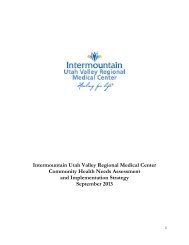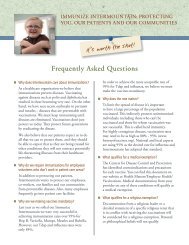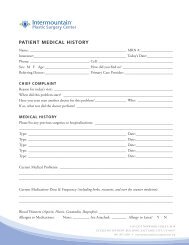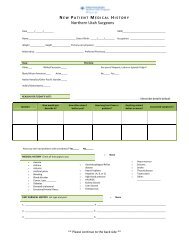permanent allergy relief? - Intermountain Healthcare
permanent allergy relief? - Intermountain Healthcare
permanent allergy relief? - Intermountain Healthcare
- No tags were found...
Create successful ePaper yourself
Turn your PDF publications into a flip-book with our unique Google optimized e-Paper software.
THECLASSROOMTHECLASSROOMTHECLASSROOMTHECLASSROOMThese areimportantquestionsfor youto ask.While anannual pelvic exam is stillrecommended, the goodnews is that the intervalbetween pap tests can nowsafely be extended for manywomen.The pap is a fabulousscreening test for cervicalcancer. First developedby George Papanicolau inthe 1920s, it was underwidespread use by the1940s. The pap test haslead directly to a significantdecrease in cervical cancerin the last 70 years.The pap test involves takinga microscopic number of cells from the cervix to determineif there are any precancerous changes. The cells are obtainedby placing a speculum in the vagina during a pelvic examand touching the cervix with a small brush and spatula. Thetest is simple, non-painful, but awkward, and women havebeen advised to have one every year.But what does the pap test have to do with HPV? HPVis an extremely common sexually transmitted infection,more prevalent than the cold sore. Most women becomeinfected with the virus soon after becoming sexually active:30 percent of women are infected by 12 months, 40 percentby 24 months, and 50 percent by 36 months. Fortunatelythe immune system can fight off this virus. By 18 monthsafter the initial HPV infection, 81percent of women willhave it resolved. And resolution is even more common inwomen younger than 30. Yet sometimes the HPV infectioncan persist, and with persistence comes an increased risk ofprecancerous changes to the cervix. If these changes are leftuntreated, the risk of developing cervical cancer increases.However these precancerous changes can be easily treated inthe office.In the last 12 years, results from medical studies on theHPV infection and cervical changes have suggested theimportance of HPV testing. By 2010, studies indicated thatadding HPV-based screening is more effective than using theclassic pap alone in preventing cervical cancer. It can helpdetect worrisome precancerous lesions of the cervix earlierand also can provide reassurance for longer periods of time.How HPVTestingImprovesthe PapHow often do I really need a pap test?What is Human Papilloma Virus(HPV) really, and how does ittie into my pap test?If you are 30 or older, yourprovider may talk to youabout adding HPV testingto your pap now. If testingshows no HPV infection andno precancerous changes,then you can wait three yearsfor your next pap. If you areyounger than 30, all you needis a normal pap because, eventhough HPV infections arecommon in this age group,they usually go away ontheir own. Very importantthough, HPV testing and thepap only evaluate the cervix.Therefore every woman stillneeds to have an annualbreast and pelvic exam toassess the health of all theother gynecological anatomy.More good news—somewomen do not need pap testsat all. If you had your cervix removed during a hysterectomyand have no history of abnormal paps, you may not need apap test again. Also if you are younger than 21, you do notneed a pap, even if you are sexually active. Finally if you areover 70, you may not need pap tests anymore. If you fallinto one of these groups, you need to talk to your providerabout your specific history and still have your annual breastand pelvic exams.Of course we all look forward to the day that the infamouspelvic exam can be replaced by an exam that uses a simplehandheld device to scan your tissues for evaluation. Untilthen improvements are being made, and our hope is for afuture without pap tests and, more importantly, withoutcervical cancer!To make an appointment with a OB/GYN near you, weinvite you to visit the index at the back of this publication orintermountainmedicalgroup.org.Kathryn E. Walker, MDObstetrics & Gynecology<strong>Intermountain</strong> Sandy OB/GYN801.501.2160sandyobgyn.orgfacebook.com/sandyobgyn30 INTERMOUNTAIN MEDICAL GROUP <strong>Intermountain</strong>MedicalGroup.org SPRING/SUMMER 2011 31
















